As you plan your travel to Libya, a North African country along the Mediterranean Sea, you’re in for a treat. Libya’s rich culture is a blend of many influences, shaped by its history and geographical location. The country’s diverse cultural heritage is reflected in its vibrant festivals, which showcase its unique traditions and history.
Despite travel challenges, Libya’s festivals offer travelers an authentic glimpse into the local way of life, blending ancient traditions with modern celebrations. You can experience the country’s diverse cultural influences, from Berber and African to Turkish and Arab cultures, reflected in its festival traditions. By understanding Libya’s festival calendar, you can plan a culturally enriching visit and immerse yourself in the local culture and history.
Discovering Libya’s Cultural Heritage
As you explore Libya, you’ll discover a cultural heritage that reflects the blend of various influences, including Berber, Arab, and African traditions. Libya’s strategic location in North Africa has made it a crossroads of civilizations throughout history, shaping its unique cultural identity.
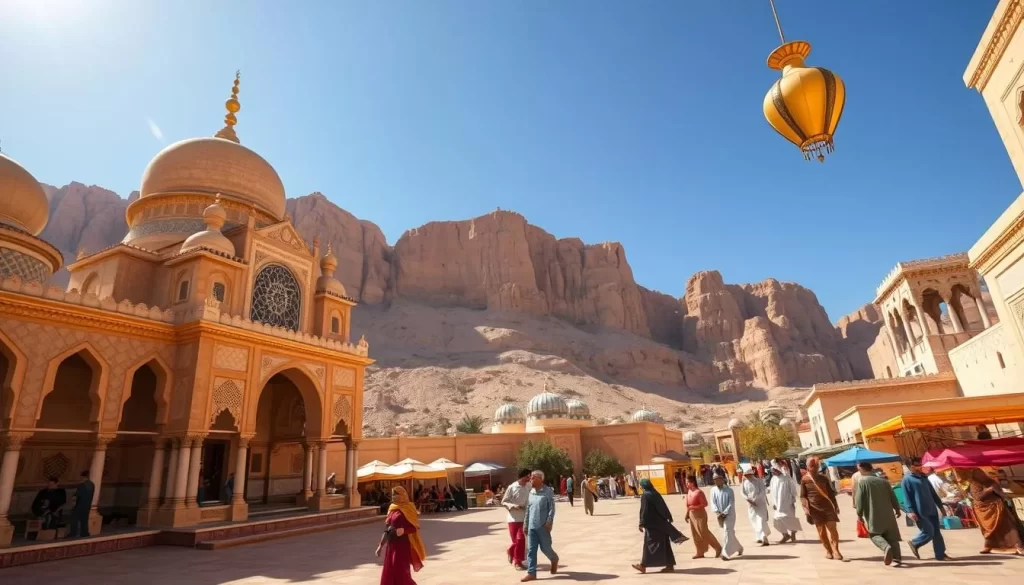
A Brief Introduction to Libyan Culture
Libyan culture is a rich tapestry, woven from the threads of its diverse history and geography. Most Libyans are Berber and Arab, with 96.6% being Muslim Sunnis. The official language is Arabic, but Berber, Italian, and English are also spoken in various communities. This linguistic diversity reflects the country’s complex history and its position as a cultural melting pot.
- The blend of Berber, Arab, Turkish, and African influences shapes Libya’s unique cultural identity.
- Libya’s geography, with vast desert landscapes and a Mediterranean coastline, has influenced different cultural practices across regions.
- The country’s cultural heritage is preserved through its language, customs, and traditions.
The Importance of Festivals in Libyan Society
Festivals play a vital role in Libyan society, serving as both entertainment and a means of preserving cultural traditions. They function as community bonding experiences, strengthening social ties and passing down cultural knowledge. These festivals reflect the religious, agricultural, and historical aspects of Libyan identity, evolving over time while maintaining their core significance.
By participating in or attending these festivals, you can gain a deeper understanding of Libya’s cultural heritage and its importance in the daily lives of Libyans. Whether you’re exploring the country’s cities or venturing into the desert, Libya’s festivals offer a unique glimpse into its rich cultural tapestry.
Libya: Top Festivals to Check Out When Visiting
As you prepare for your journey to Libya, understanding the country’s festival calendar is essential for an immersive experience. Libya’s festivals are a window into its rich cultural heritage, blending desert traditions, coastal influences, and historical elements in a way that’s unique to this North African country.
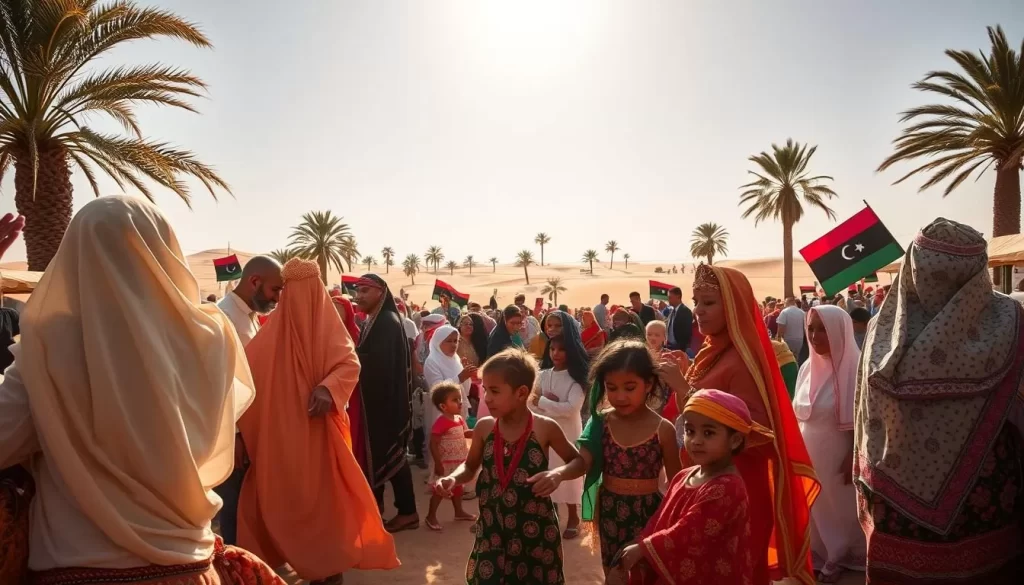
What Makes Libyan Festivals Unique
Libyan festivals stand out from celebrations in neighboring countries due to their distinctive blend of cultural influences. You can experience traditional music, dance, food, and crafts that are not found elsewhere, making these festivals a true cultural immersion.
The intimate community nature of many Libyan festivals allows visitors to participate in authentic cultural experiences rather than commercialized tourist events. This unique aspect makes Libyan festivals a compelling reason to travel to Libya.
Best Times of Year for Festival Tourism
The best time to visit Libya for festivals is during the spring (March to early May) and autumn (October and November), when the climate is mild and conducive to outdoor celebrations. These periods offer the most comfortable conditions for attending festivals, with manageable daytime temperatures and pleasant evenings.
When planning your travel to Libya, it’s crucial to consider the extreme temperature variations in the desert regions. From December to February, nighttime temperatures can drop to sub-zero levels, while the summer months (mid-May to September) are characterized by unpleasantly hot temperatures, often reaching the mid-40°Cs.
Understanding the Libyan festival calendar is key to planning your visit around multiple festivals. Some festivals are tied to the Islamic lunar calendar, which means their dates shift each year, requiring advance planning. Working with a local guide can help ensure that you participate appropriately in these events and make the most of your time in Libya.
By choosing the right day and time to visit, you can enjoy a rich array of cultural options, from traditional parades to local cuisine and crafts, making your festival experience in Libya truly unforgettable.
Acacus Festival: Music Under Desert Stars
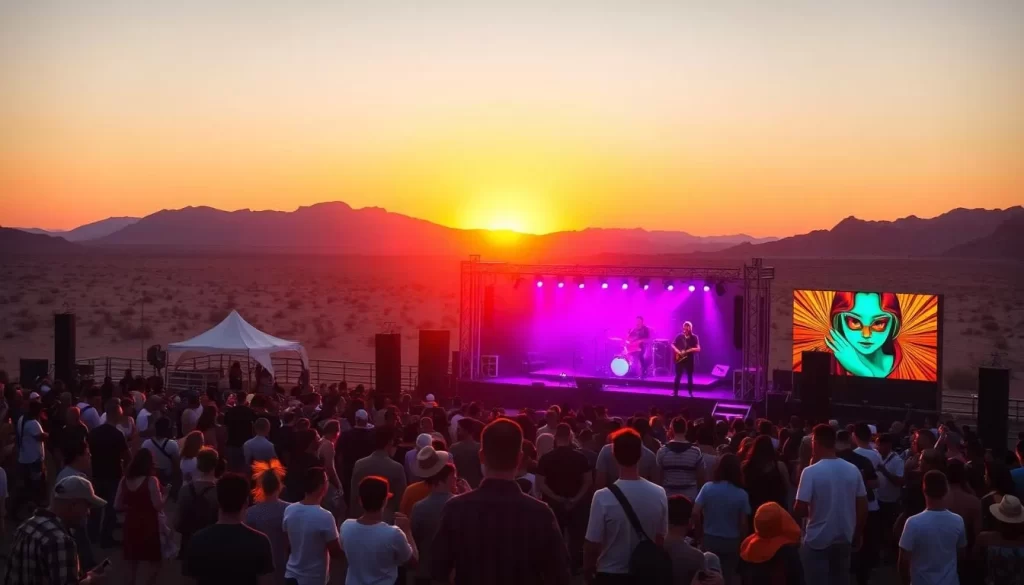
In the heart of the Sahara, the Acacus Festival transforms the desert into a vibrant stage for musical performances. Held annually between December and January in Libya, this unique event takes place among the spectacular scenery of the Jebel Acucus basalt monoliths.
Location and Setting in the Sahara
The Acacus Festival is set in the dramatic basalt monoliths of the Jebel Acacus region, a breathtaking desert landscape that offers an otherworldly backdrop for cultural celebration. The journey to this remote location is part of the adventure, with travelers experiencing the vast expanses of the Sahara Desert.
As you travel to the festival, you can expect a unique blend of natural beauty and cultural richness. The region is also known for its prehistoric rock art sites, which festival attendees might have the opportunity to visit.
Musical Performances and Cultural Activities
The festival showcases a variety of music genres, including traditional Tuareg desert blues, Bedouin folk music, and contemporary Libyan fusion styles. As the sun sets, the performances begin, creating a magical atmosphere against the backdrop of the desert landscapes.
Beyond the musical performances, visitors can participate in various cultural activities such as traditional craft demonstrations, storytelling sessions, and place-based desert astronomy. The festival serves as a bridge between visitors and local Tuareg and Berber communities, who share their rich cultural heritage through music and art.
Nalut Spring Festival: Celebrating Mountain Heritage
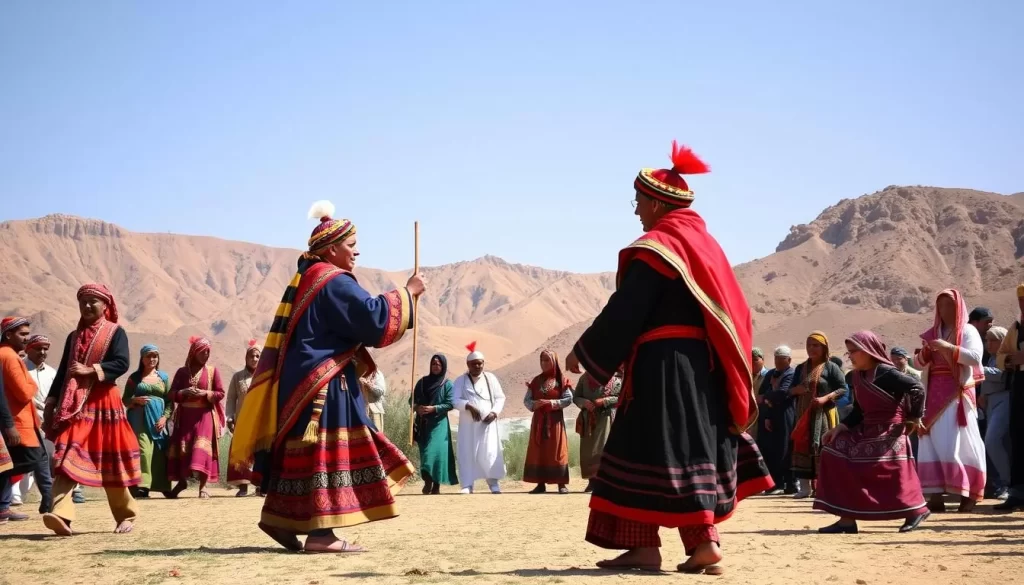
Nestled in the mountainous Jebel Nafusa region, the Nalut Spring Festival is a vibrant celebration that embodies the rich cultural heritage of Libya. As you visit this event, you’re not just attending a festival; you’re immersing yourself in the local culture.
Traditional Parades and Performances
The Nalut Spring Festival is renowned for its vibrant traditional parades that wind through the streets of Nalut. You can witness colorful costumes, lively music, and energetic dance performances that showcase the region’s Berber heritage. The parades are a highlight of the festival, featuring traditional folk dances and horseback riding demonstrations that continue into the night.
As you watch these performances, you’ll notice the significant role women play, both as performers and as keepers of traditional crafts and culinary arts. Their participation enriches the festival, making it a truly inclusive celebration.
Local Crafts and Cuisine
During the festival, you can explore local craft exhibitions where artisans showcase and sell traditional Berber textiles, pottery, jewelry, and leatherwork. This is a great opportunity to purchase unique souvenirs and support local artisans.
The festival also offers a culinary journey, with special foods prepared during this celebration, including regional specialties that might not be available at other times of the year. Be sure to try some of the local cuisine, which is an integral part of the festival experience. As a guide to the local culture, the food and crafts on display will give you a deeper understanding of the town’s traditions and the surrounding areas.
To make the most of your visit, it’s essential to respect local customs regarding dress and interaction. By doing so, you’ll be able to fully participate in the festival activities and enjoy the warm hospitality of the Nalut community.
Ghadames Festival: The Pearl of the Desert
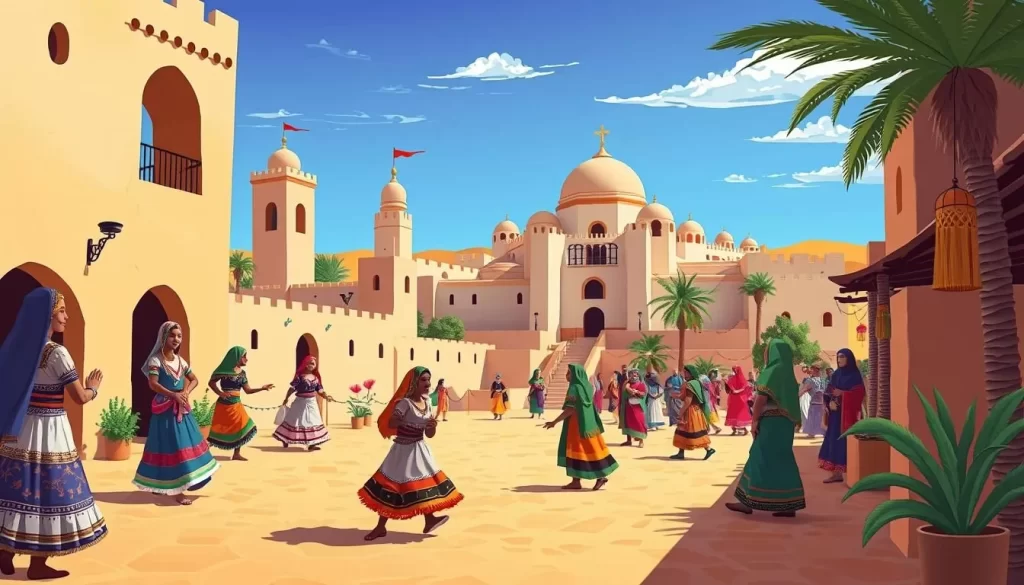
Every October, the historic oasis town of Ghadames comes alive with its annual festival, attracting visitors from across the Sahara. Ghadames, known as the ‘Pearl of the Desert,’ is a UNESCO World Heritage site and one of the oldest pre-Saharan city with its distinctive white architecture and covered streets.
Cultural Celebrations of Tuareg and Berber
The Ghadames Festival is a vibrant celebration of Tuareg and Berber cultural heritage. You can experience the rich traditions of these communities through traditional music, dance, and storytelling. The festival is a unique opportunity to witness the preserved cultural practices of these ancient communities.
The festival strengthens bonds between different Saharan communities, promoting cultural exchange and understanding. As you participate in the festivities, you’ll be immersed in the warm hospitality of the Tuareg and Berber people.
Date Harvest Traditions and Market
The Ghadames Festival coincides with the annual date harvest, a crucial event for the oasis town. The old city’s center transforms into a bustling market where freshly harvested dates of numerous varieties are sold alongside food and traditional crafts. You can sample local delicacies made from the newly harvested dates, experiencing the rich flavors of the region.
During the festival, you can also witness traditional contests, including horse and camel races, which demonstrate the skills valued in desert cultures. To get the most out of your visit, consider joining guided tours that offer unique access to homes and areas of Ghadames that might not be accessible at other times of the year, with the help of a knowledgeable guide.
Zuwarah Awessu Festival: Ancient Rituals by the Sea
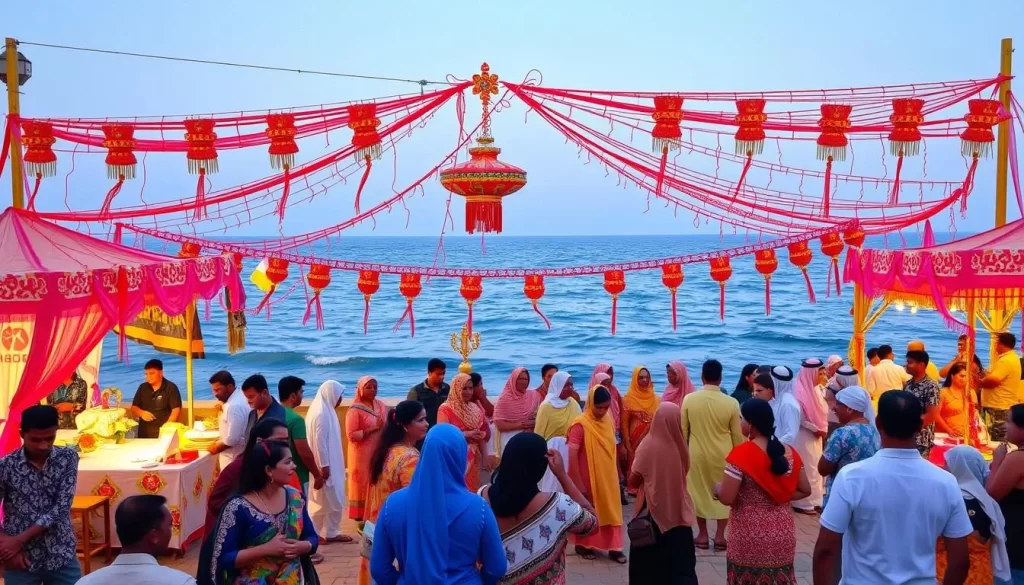
Libya’s Zuwarah Awessu Festival is a captivating celebration that blends ancient pagan rituals with modern practices. Held in the coastal city of Zuwarah during the hot summer season, this festival is a unique cultural experience.
The Origins of the Celebration
The Awessu Festival has its roots in ancient pagan rites, making it one of North Africa’s oldest continuous cultural traditions. Historically, the festival involved ritual sea bathing for tribes and their animals, believed to bring health and prosperity for the coming year. The water rituals were an essential part of the celebration, symbolizing cleansing and renewal.
The original nude bathing practices have been adapted over time to align with Islamic moral codes, now featuring clothed swimming and sailing races. Despite these changes, the festival retains its pre-Islamic essence, blending traditional and modern elements.
Modern Festival Activities
Today, the Zuwarah Awessu Festival is a vibrant celebration that includes folk dances, music performances, and communal meals. The modern activities maintain the symbolic significance of the original rituals while respecting local customs and sensitivities.
Visitors can participate in various aspects of the festival, such as swimming and sailing competitions, which have replaced the original ritual bathing. The August timing of the festival coincides with the hottest part of summer, when the sea water is believed to have special properties according to local tradition.
The festival serves as an important cultural identifier for the people of coastal Libya, distinguishing their traditions from those of the desert interior. It offers a unique insight into Libya’s complex religious history and the blending of ancient traditions with contemporary practices.
Religious Celebrations: Eid el Fitr and Islamic Traditions
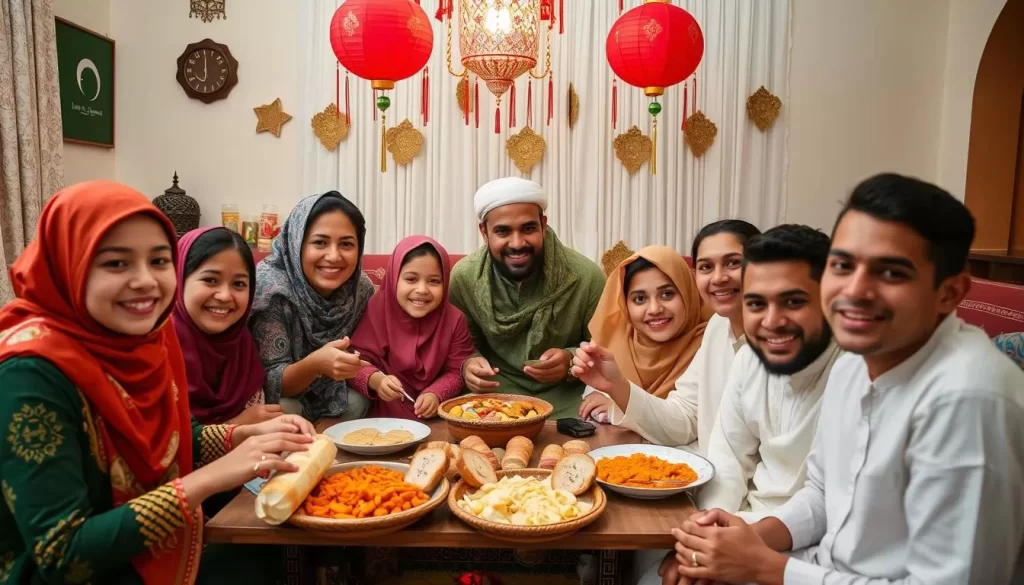
As Ramadan comes to a close, Libya celebrates Eid el Fitr with vibrant festivities that reflect the country’s deep-rooted Islamic heritage. This significant religious celebration marks the end of the month-long fasting period, bringing families and communities together in joyous feasting and prayer.
Family Gatherings and Feasting
Eid el Fitr is a time for family reunions, where multiple generations come together to share elaborate meals and exchange gifts. The preparations begin well in advance, with homes being cleaned and decorated, and traditional foods such as special breads, lamb dishes, and distinctive sweets being prepared. The role of women is particularly significant during this time, as they are often at the forefront of preparing these elaborate meals and participating in specific customs and traditions.
Public Celebrations and Customs
The celebration of Eid el Fitr is not limited to family gatherings; it also involves public prayers at mosques and community events in public squares. The atmosphere is filled with the spirit of charity, as people engage in various charitable activities. Visitors to Libya during this time can experience the rich cultural heritage of the country by participating in these public celebrations. It’s also an opportunity to learn a few key phrases in language, such as “Eid Mubarak,” which means “Blessed Eid,” to connect with the locals.
While Eid el Fitr is celebrated across the Middle East, the customs and traditions in Libya have their unique flavor, reflecting the country’s history and cultural identity. Understanding and respecting these local customs can enhance your experience if you visit Libya during this festive time.
Practical Tips for Festival Visitors to Libya
To make the most of your festival experience in Libya, consider these practical tips. Before planning your trip, check the current travel advisories and security situation, as conditions can change rapidly. Ensure you understand the visa requirements and application process, which may vary depending on your country of origin.
Joining organized tours with reputable guides can be the safest and most practical way to experience Libyan festivals. Learn key Arabic phrases to enhance your interaction with locals. Be mindful of safety considerations, including dress codes and cultural sensitivities.
When attending festivals, try traditional dishes, but take necessary food safety precautions. Women travelers should be aware of local customs and dress modestly. You can combine festival visits with explorations of Libya’s famous archaeological sites like Leptis Magna. By being informed and prepared, you can have a rich and memorable cultural experience in Libya.
The above is subject to change.
Check back often to TRAVEL.COM for the latest travel tips and deals.
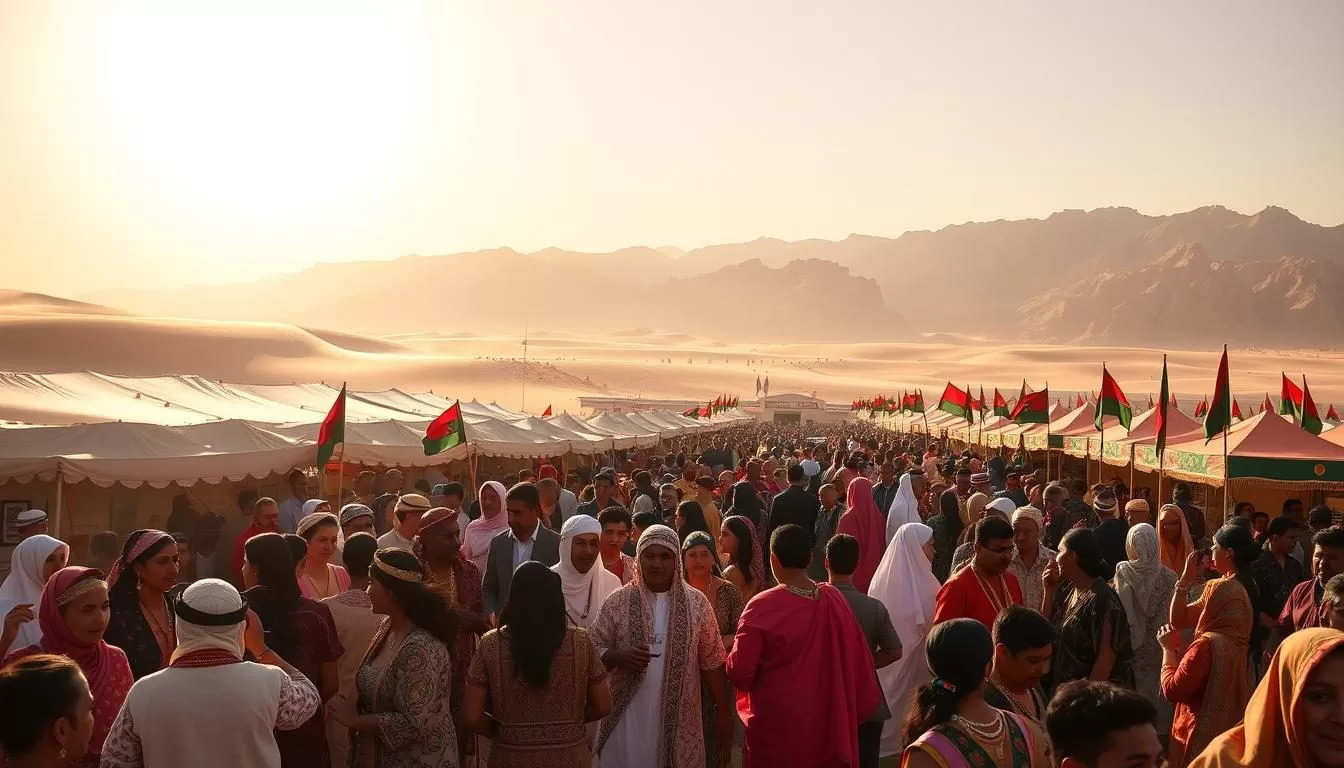
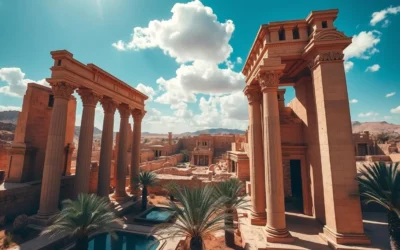
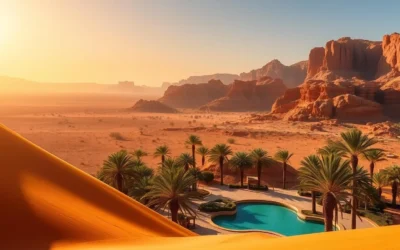
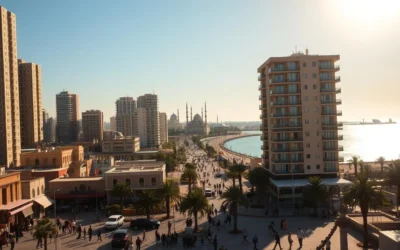
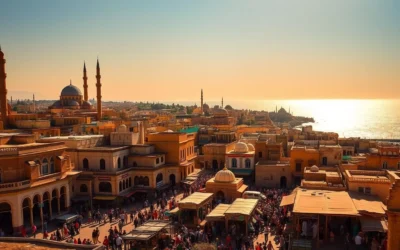
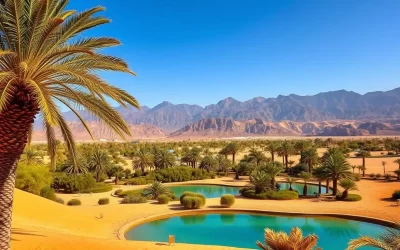
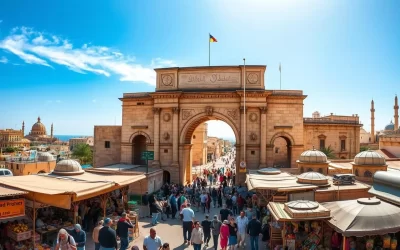
0 Comments